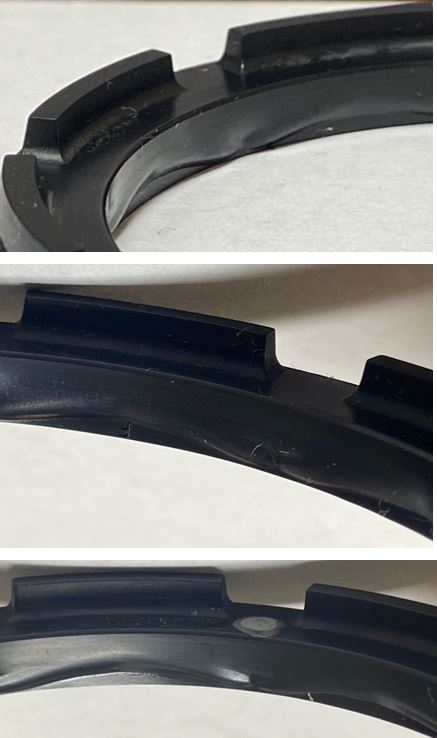Kalsi Tanged Seals were developed to prevent rotary seals from circumferentially slipping in the seal groove which can lead to premature seal failure. Rotary seals slip more often in applications where the environment fluid pressure is greater than the seal lubricant pressure, a condition we refer to as reverse pressure. In June 2019 we reported on the successful testing of tanged seals operated at reverse pressure conditions. Additional reverse pressure testing of tanged seals at 300°F was also successful, as reported in August 2021. In these tests the tanged seals were lubricated with an ISO 680 viscosity grade lubricant which is used in many gearboxes. We have continued evaluating tanged seals at reverse pressure conditions using lower viscosity lubricants.
We recently completed testing of 674-12-11 tanged seals running against an abrasive environment fluid pressurized to 500 psi higher than the seal lubricant. The seals were run on a 2.75” shaft rotating at 364 RPM and lubricated with an ISO 48 viscosity grade oil maintained at 165°F. The test simulates the conditions experienced by progressive cavity pump stuffing box seals. As shown in Figure 1, the test seals were in excellent condition at the conclusion of the 50-hour tests. A total of three tests were performed to demonstrate repeatability.
This testing shows that the 674 series tanged seal is effective at excluding an abrasive environment fluid at high differential reverse pressure conditions even when lubricated with low viscosity lubricants, making this an excellent seal for submerged gearboxes, progressive cavity pump stuffing boxes, and other equipment where rotary seals are subjected to reverse pressure conditions.
For additional information on implementing the Kalsi Tanged Seal see the seal gland guidelines & dimensions chapter in our Kalsi Seal Handbook or contact one of our experienced engineers.

Recent Blog Entries
- Kalsi Engineering (KEI) Announces Completion of NASA-Funded SBIR Phase II Project
- High-pressure and high-speed RCD seal testing
- Extra Wide Hybrid mud motor seal that fits in existing mud motor housings
- Fast Response Flow Control Valves for Gaseous Hydrogen Fueling of Fuel Cell Vehicles
- Kalsi Engineering Turns 45 on September 5, 2023!
